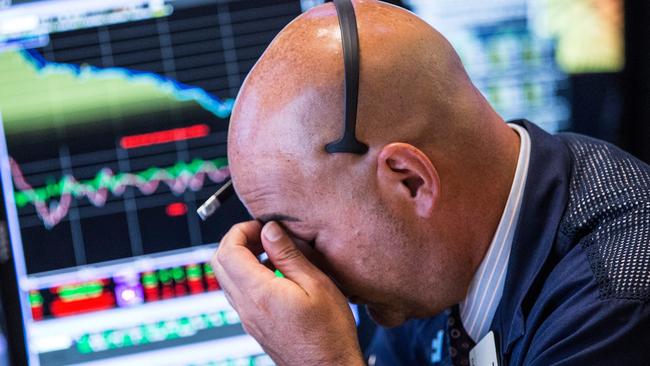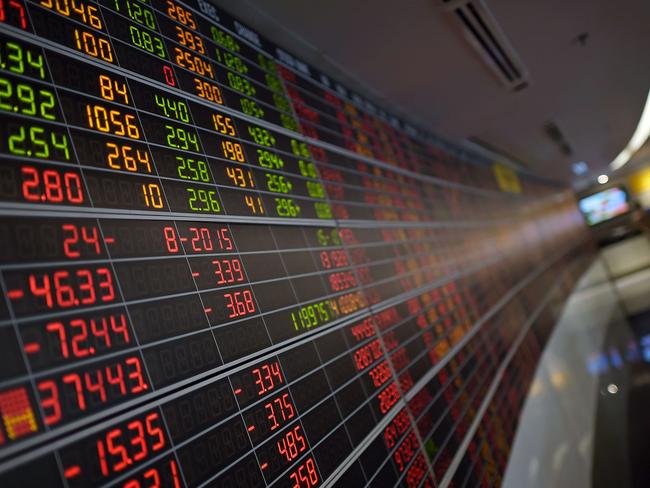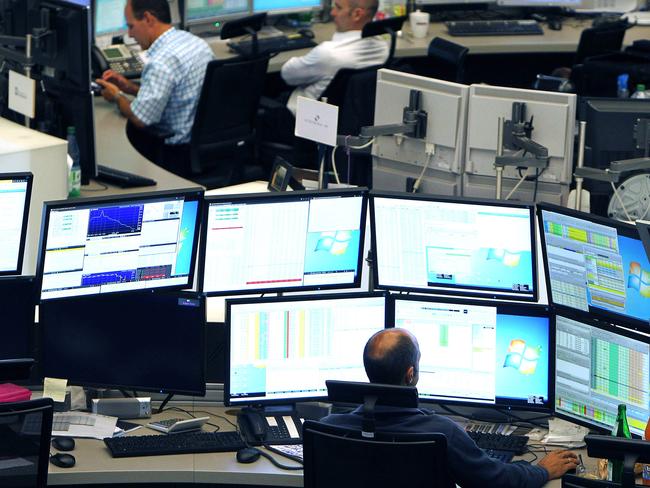China’s ‘Black Monday’ felt on stock markets around the world
BILLIONS have been wiped off global markets amid fears that China’s “Black Monday” could shatter the world’s economy.
BILLIONS of dollars have been wiped from financial markets in the US, Europe and Asia as fallout from China’s “Black Monday” reverberates around the world.
The US Dow Jones index crashed more than 1000 points within minutes of opening before stabilising to trade around five per cent lower on Monday. It’s an unprecedented move for the Dow which has never lost more than 800 points in a single day.
• LIVE: ASX SEE-SAWS AFTER INITIAL PLUNGE
Stockmarkets in the UK, Germany, France, Italy and Spain also plummeted after China’s Shanghai Composite Index lost 8.5 per cent on Monday — the largest margin in eight years.
The UK’s FTSE 100 index lost more than $85 billion in the first three hours of trading while markets in Japan, Hong Kong, Korea and Australia all closed more than more than 4 per cent down.
The massive sell off, dubbed the “Great Fall of China” is being stoked by fears China has lost control of the situation and doesn’t have the means to fix it.
ABN Amro chief investment officer Didier Duret told Reutersmarkets were embroiled in a “China-driven micro panic” and “volatility will persist until we see better data there or strong policy action through forceful monetary easing.”
Global equities have seen more than $5 trillion wiped from their value since China opted to devalue its currency in a shock move on 11 August.
Finance author Fraser Howie, who wrote Red Capitalism: The Fragile Financial Foundation of China’s Extraordinary Rise told The Guardian there is a “growing realisation” China’s leaders do not have a clear idea of how to handle things.
“Not only are they not in control of it, they don’t even seem to grasp the problems at times,” he said.
The losses have also pushed oil prices four per cent lower and caused the CBOE Volatility Index — a key measure of volatility in US share markets — to spike more than 50 for the first time since 2009, Reuters reports.


BUBBLE TROUBLE
IG Markets Angus Nicholson said Monday’s losses are a “disastrous result” for China which has spent “hundreds of billions of dollars propping up the market since June”.
The Shanghai Composite Index is down 38 per cent from its peak on 12 June with many small investors suffering the heaviest losses which could derail Communist Party plans to use the market to finance reforms.
Social media specialist Pan Chong, 25, said “it feels like the end of the world” after investing 50,000 yuan ($7900) in April, making 40 per cent and then seeing the market wipe out his gains.
“The so-called correction will finally become a long-term bear market,” he said. “So I’m considering selling all my shares as soon as possible.”
The chaos in China comes after the benchmark index soared more than 150 per cent starting in late 2014 after state media said shares were inexpensive, which led investors to believe Beijing would shore up prices if needed. Urged on by state media, millions of novice investors rushed into the market.
However prices faltered, then plunged after an unrelated change in banking regulations in June led investors to question whether Beijing’s support might be weakening. The market index fell 30 per cent, prompting Beijing to intervene by barring big shareholders from selling and promising state-owned brokerages and pension funds would buy.
Beijing’s initiatives helped to calm markets. But after the state-owned company charged with buying shares to prop up prices announced it would not intervene every day, the Shanghai index fell 11.5 per cent last week.
Sunrise Broker's head of Asian and Japanese equities, Benjamin Collett said the losses have dragged other markets down with them.
“How much of this is China’s fault? Probably all of it,” said Mr Collett.
“We attribute most of the gains to the epic rally in China, and now naturally I think it’s reasonable to assume that investor sentiment is solely focused on China.”

The declines come at a time when exports, manufacturing and other Chinese industries are weakening, leaving little economic support for higher share prices.
The latest fall probably was triggered by poor performance at publicly traded companies, said Guo Tianyong, a professor at the Central University of Finance and Economics in Beijing.
The government reported last week that profits at state-owned companies contracted by 2.3 per cent in July from a year ago, compared with a 0.1 per cent contraction through June.
“We shouldn’t doubt the government’s ability to rescue the market. If they want, they could push up the stock index to 5000, but it is not necessary for the government to play an excessive role,” said Guo. “It still would be better for the market itself to play its role.”
The surprise devaluation of the yuan on August 11 also led to jitters from investors who worry it will lead money to flow out of China, reducing credit available for trading. The central bank has responded by pumping extra money into credit markets.
The ruling party wants to use the markets to raise money for state companies to reduce debt and modernise. The party also wants to encourage stock ownership as a way for families to save for retirement, reducing demand for social spending. But small investors whose holdings have plunged in value say they will no longer buy shares.
Lu Zhen, 29, an employee at a financial firm, said the value of his shares rose by 250,000 yuan ($40,000) over the first half of the year. But he said since the June downturn, he has lost that and an additional 150,000 yuan ($24,000).
“This is definitely the end of a bull market,” Lu said.
— With Joe McDonald, AP researchers Dong Tongjian and Yu Bing in Beijing and AP Business Writer Kelvin Chan in Hong Kong.



